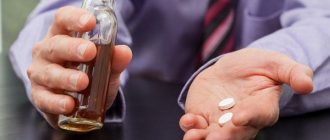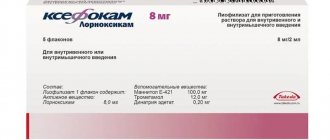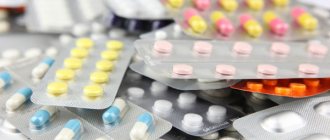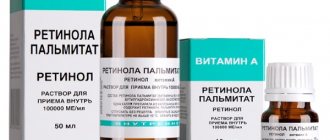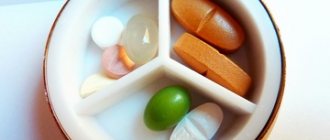Nicotinic acid in ampoules is widely used in medicine for the treatment of cardiac diseases, pathologies of the musculoskeletal system; the drug also has a beneficial effect on the condition of the skin and hair. The advantage of the injection form of drug administration is the simplicity and accuracy of the dosage, the speed of onset of the effect, and the absence of unwanted reactions from the gastrointestinal tract. Doctors advise injecting nicotinic acid according to a regimen that is developed taking into account the patient’s general well-being and the presence of concomitant pathologies.
In this article you will learn about the pharmacokinetics and pharmacodynamics of niacin when administered parenterally, indications and contraindications for prescribing the drug, dosage rules and injection techniques. The following provides information about possible side effects of the drug, signs of overdose, compatibility with vitamins and other medications.
Pharmacodynamics
Nicotinic acid is a specific antipellagric agent. It has a pronounced short-term vasodilating effect, improves carbohydrate and nitrogen metabolism, and improves microcirculation.
In the body, nicotinic acid is converted into nicotinamide, which binds to coenzymes codehydrase I and codehydrase II (NAD and NADO), which transport hydrogen, and participates in the metabolism of proteins, amino acids, purines, tissue respiration, glycogenolysis, and synthetic processes.
Replenishes the deficiency of vitamin PP (vitamin B3).
It has a vasodilating effect at the level of small vessels (including the brain), improves microcirculation, and has a weak anticoagulant effect (increases fibryolytic activity of the blood).
The benefits of nicotinic acid injections
The drug has many positive properties and its health benefits are impressive. If the body contains nicotine in sufficient quantities, then all organs and systems in it function clearly and correctly. Nicotinic acid, injections, what are they prescribed for? It is used for different purposes - for example, for:
- restoration of impaired blood supply in certain areas of the body and brain;
- normalization of metabolic processes;
- normalization of lipid and carbohydrate metabolism;
- relieving detoxification symptoms in case of poisoning;
- expansion and strengthening of blood vessels;
- control of oxidative processes;
- speedy conversion of sugar into energy;
- improving bowel function;
- memory improvements;
- strengthening the immune system;
- correction of liver function;
- putting the nervous system in order;
- stabilization of hormonal levels;
- control of hemoglobin synthesis.
Among other things, nicotine improves sleep, stabilizes blood cholesterol levels, takes part in the production of gastric juice and controls some functions of the digestive tract. By understanding what nicotinic acid helps with, and for what purpose the injections are prescribed, you can understand why doctors chose injections. Everything is simple with this - this way the drug penetrates the body faster and is distributed more evenly. In addition, the injections help prevent irritation of the gastric mucosa.
Pharmacokinetics
When administered parenterally, it is quickly distributed in the tissues of the body. It accumulates mainly in the liver, as well as in adipose tissue and the kidneys.
In the liver, nicotinic acid is converted into an amine, which is incorporated into nicotinamide adenine dinucleotide (NAD), which is a prosthetic group of enzymes that transfer hydrogen and carry out redox processes. The main metabolites are N-methyl-2-pyridone-3-carboxamide and N-methyl-2-pyridone-5-carboxamide, which do not have pharmacological activity.
It can be synthesized in the intestine by bacterial flora from tryptophan supplied with food (60 mg of tryptophan produces 1 mg of nicotinic acid) with the participation of pyridoxine (vitamin B6) and riboflavin (vitamin B2).
The half-life is 45 minutes.
It is excreted from the body by the kidneys in unchanged form and in the form of metabolites; when taking high doses, it is mainly unchanged. Renal clearance depends on the level of nicotinic acid in the blood plasma and may decrease at high plasma concentrations.
Analogs
The drug has no structural analogues or agents that would have the same properties. If for any reason the patient cannot take vitamin B3, other B vitamins, such as thiamine, pyridoxine, riboflavin or cyanocobalamin, are prescribed.
Only one product can be used as a substitute - Nikoshpan tablets. They contain not only nicotinic acid, but also drotaverine, which has antispasmodic properties. The drug is prescribed to relieve pain and improve blood circulation in the affected area.
Indications for use
Indications for intramuscular injections of nicotinic acid are:
- Hypovitaminosis RR, vitamin deficiency RR (pellagra);
- Hartnup's disease (a hereditary disease accompanied by impaired absorption of certain amino acids, including tryptophan).
As part of combination therapy it is prescribed for:
- ischemic stroke;
- obliterating diseases of the vessels of the extremities (obliterating endarteritis, Raynaud's syndrome);
- neuritis of the facial nerve;
- diabetes mellitus, including its complications (diabetic polyneuropathy, microangiopathy);
Nicotinic acid injections - indications
The substance can be taken both for treatment and as a prophylactic. Nicotinic acid, injections, what are they prescribed for? One of the most common indications is a lack of vitamin PP - pellagra. The drug is effective for diseases of the cardiovascular system. It helps dissolve blood clots. Thanks to this, areas of blood vessels that were blocked open up.
Before you start using nicotinic acid, injections, the instructions for its use must be studied. From it you can find out that the medicine is also prescribed for:
- spasms of blood vessels (limbs, brain, kidneys...);
- atherosclerosis;
- hypoacid gastritis;
- neuritis of the facial nerve;
- ulcers and wounds of various localizations that do not heal over a long period of time;
- complications of diabetes;
- liver diseases;
- intoxications of various origins.
Nicotinic acid injections for osteochondrosis
This disease occurs when the cartilage in the spinal discs does not receive enough nutrition. As a result, structural changes begin to occur in them, and they become thinner. At the same time, the condition of the bone tissue deteriorates, which becomes deformed and becomes covered with growths in some places. Nicotinic acid, injections, what are they prescribed for, in this case - how can they help? Very fast and efficient!
The injections begin to work almost immediately.
- They relieve the main symptoms of osteochondrosis, eliminate dizziness, restore the processes of supplying tissues and organs with nerve cells, and normalize the general condition.
- Nicotine affects not only the general physical, but also the mental state of a person - the drug gives vigor, improves vitality, and normalizes sleep.
- Injections of nicotinic acid, their beneficial property, accelerates blood microcirculation in soft tissues, thereby reducing pain, and the regenerating properties of the drug help to significantly accelerate the process of restoration of damaged cartilage tissue, muscles, ligaments, and vessel walls.
- Among other things, nicotine can normalize oxygen metabolism and activate oxidative processes.
Nicotinic acid for hair - injections
This substance is often found in hair care products.
- Nicotinic acid injections perfectly moisturize curls, enhance their growth, prevent hair loss and fight dandruff.
- The effect is due to the vasodilating property of the product, due to which blood flow improves and the hair follicles begin to receive more nutrients.
We have sorted out nicotinic acid, hair injections, and what they are prescribed, but you also need to know how to use the drug correctly. To make your hair healthier and stronger, use the product for a month. Every day, the contents of one ampoule are applied to clean curls. Treatment can be done by hand or using a syringe without a needle. If 1 ml is not enough, you can use a second ampoule at a time, but no more.
There is no need to wash off the nicotine mask. Immediately after the procedure, goose bumps, a burning sensation, and redness may appear. This phenomenon is normal - it means that the remedy has begun to work. Another thing is headache, itching and rash. Such symptoms indicate individual intolerance and that hair treatment with nicotinic acid should be stopped. Those for whom the therapy is suitable will notice a growth of up to 3 centimeters in their curls within a month.
Nicotinic acid - injections for weight loss
Every body needs nicotinic acid. The optimal amount is up to 20 milligrams per day. You can get it from food - meat and some plant products. A deficiency of the substance has a negative effect on health. This leads to a lack of serotonin, and the body tries to compensate for the deficiencies of the latter by demanding high-calorie foods - cakes, buns, sweets.
How do nicotinic acid injections help you lose weight? Of course, she is not a fat burner. That is, just injections cannot cope with extra pounds, but they can:
- speed up metabolic processes; force gastric juice to be produced more actively;
- injections promote the production of the all-important serotonin.
Simply put, nicotine will discourage you from eating unhealthy, fatty, high-calorie foods, help you stick to a proper diet, and enhance your metabolism.
Directions for use and dosage
For pellagra, adults are prescribed parenterally (intravenously, intramuscularly or subcutaneously) 1 ml of 1% (10 mg) solution 2-3 times a day for 10-15 days.
For ischemic stroke, 10 mg of solution is administered slowly intravenously.
The regimen for other indications is 10 mg 1-2 times a day for 10-15 days.
Hartnup disease - 40-200 mg per day.
Higher dosages for adults:
- single dose - 100 mg,
- daily - 300 mg.
List of drugs
Nicotinic acid medications for injection are available in glass ampoules of 1 ml each. In addition to niacin, the preparations contain sodium bicarbonate and water. Standard packaging contains 10 ampoules in a cardboard box and detailed instructions from the manufacturer. Medicines with vitamin PP can be bought in hospital pharmacies at a low price. Below are the drugs that are most common in Russia.
| Name of medicine | Manufacturer and country of production | Prices in pharmacies |
| Nicotinic acid-SOLOpharm injection solution | Grotex LLC, Russia | From 27 rubles |
| Nicotinic acid, injection solution 1% 1 ml | Pharmstandard-Ufavita, Russia | From 41 rubles |
| Nicotinic acid ampoules 1%, 1 ml, 10 pcs | Health, Russia | From 23 rubles |
| Nicotinic acid, ampoules 1%, 1 ml | Biosynthesis, Russia | From 22 rubles |
| Nicotine supplement Bufus Renewal injection solution 1% | PFC update, Russia | From 71 rubles |
Open catalog
Contraindications
Atherosclerosis, hypersensitivity to nicotinic acid, peptic ulcer of the stomach and duodenum (in the acute stage), gout, hyperuricemia, hepatitis, cirrhosis of the liver, decompensated diabetes mellitus.
With caution: hemorrhages, glaucoma, hyperacid gastritis, peptic ulcer of the stomach and duodenum (beyond the acute stage), arterial hypotension, pregnancy, lactation, childhood.
Reviews
Sergey, 36 years old : They always inject me with nicotine when I go to the hospital with radiculitis. Only they give injections not intravenously, but intramuscularly. The injection is of course very painful, after it the face and ears burn, the tongue and lips burn. But gradually, from injection to injection, this manifests itself less and less. You can tolerate it.
Zinaida, 28 years old : The first time I was prescribed nicotinic acid, I had the impression that I was “on fire.” But after about 15 minutes everything goes away. The nurse advised me to have something to eat before taking the drug injections. Yes, indeed, if not on an empty stomach, the drug is easier to tolerate.
Milena, 44 years old : The drug is inexpensive but effective. It is not for nothing that it has been prescribed for many years for osteochondrosis and radiculitis, even despite the fact that there are now many other modern drugs. This vitamin also helps small wounds and cuts on the skin heal well, and hair and nails grow better. Why buy something new and expensive if you have something old that has been reliable and proven over the years?
Side effects
Side effects may occur when using nicotinic acid:
- From the cardiovascular system: a feeling of a “rush” of blood to the scalp, flushing of the skin of the face and upper half of the body, orthostatic hypotension, collapse, feeling of heat, headache. With rapid intravenous administration, a significant decrease in blood pressure and dizziness is possible.
- From the central and peripheral nervous system: paresthesia, dizziness.
- From the digestive system: with long-term use - fatty liver.
- From the metabolic side: with long-term use - hyperuricemia, decreased glucose tolerance, asthenia, increased blood levels of aspartate aminotransferase, lactate dehydrogenase, alkaline phosphatase.
- Local reactions: pain at the injection site with subcutaneous and intramuscular injections.
- Other: allergic reactions (skin rash, skin swelling, wheezing, urticaria).
Overdose
Nicotine injections (indications for use should be carefully studied by patients before starting the course) rarely lead to an overdose if used correctly. Only with uncontrolled use of tablets or administration of increased doses of solution do patients develop severe complications.
Many people note a rush of blood to the skin, headache and dizziness. An overdose may be accompanied by darkening of the eyes, temporary blurred vision, and the appearance of spots before the eyes.
Patients often experience:
- repeated vomiting during the day;
- strong thirst;
- dryness of the mucous membranes of the oral cavity.
Repeated vomiting during the day indicates an overdose of nicotinic acid.
An overdose leads to worsening or complete absence of appetite, weakness and fatigue.
Allergies with this disorder are more pronounced and are accompanied by the spread of the rash to large areas of the skin, as well as unbearable itching and swelling of the mucous membranes.
If negative reactions or signs of overdose occur, you should stop using the product and visit a doctor. The patient usually receives help in a hospital setting; the treatment regimen differs depending on the manifestations of the overdose.
Within a few days the patient's condition returns to normal. You cannot ignore symptoms or self-medicate. This can lead to worsening of the condition and development of life-threatening consequences.
Impact on the ability to drive vehicles
There is no data on the effect on the ability to drive vehicles or operate machinery. However, some adverse reactions (orthostatic hypotension, collapse, dizziness) may have a negative impact on the ability to drive vehicles or operate other machinery. Patients experiencing these adverse reactions are advised to refrain from driving vehicles or operating other machinery until these symptoms disappear completely.
special instructions
External use of the medicine may provoke a rush of blood to the treated area , so it is important to make sure that this does not cause complications. With intramuscular and subcutaneous infusion, patients note a pronounced burning sensation in the injection area. This is not considered a cause for concern as it is a normal reaction.
When injecting, you should follow the injection technique
If the patient does not immediately feel the therapeutic effect when using it, this is not a reason to refuse treatment. The product does not help eliminate severe pain or quickly relieve symptoms of various diseases, so it is important to prepare for a full course.
When administered intramuscularly, it is important to avoid infusion into one area. It is necessary to change the injection site, which will help prevent the formation of a painful lump or even an abscess.
If this happens, you should not self-medicate and apply homemade compositions to the affected area. You should consult a doctor immediately. Often the only treatment option is surgery.
Pharmacological and biochemical properties
In the body, niacin optimizes the metabolism of fats, proteins, lipids, purines and stimulates the processes:
- providing cells with oxygen;
- DNA replication;
- optimization of metabolic processes;
- hormone production.
The healing properties of acid are widely used by doctors to prevent pellagra. In addition, it affects the patient in many ways:
- improving the functioning of the circulatory system, dilating blood vessels;
- saturation of tissues with oxygen;
- activation of heart nutrition;
- improvement of neurological indicators;
- activation of the brain;
- destruction of blood clots;
- assistance to the functioning of the gastrointestinal tract;
- activation of hormone production;
- memory improvement;
- when necrotic areas appear in the brain and heart muscle - creation of additional blood flow paths;
- increased elasticity of ligaments and joints;
- increasing immunity;
- removal of intoxication;
- increased hair growth.
When combined with proteins, niacin forms hundreds of different enzymes that promote hydrogen atoms. Macroelements, when broken down, release a lot of energy. DNA is synthesized, tissue respiration improves.
Composition and release form
Although nicotinic acid is of natural origin, it is considered a medicine. Niacin is expressed by the chemical formula C6H5NO2. The compound includes carbon, hydrogen and nitric oxide. It is synthesized in laboratories by the oxidation of pyridine. The active ingredient niacin is converted into nicotinamide, which has a positive effect on all organs.
Nicotinic acid has vasodilating, bactericidal and specific antipellagritic (pellagra - vitamin deficiency resulting from a lack of vitamins PP, proteins) properties.
Nicotine is available in tablet form or as a solution for various types of injections.
The contents of the tablet are:
- nicotinic acid – 0.05 grams;
- octadecanoic acid;
- glucose.
Solution for injections of nicotinic acid (volume – 1 ml):
- nicotinic acid (key component) – 10 milligrams;
- sodium bicarbonate;
- distilled water.
The medicinal solution in ampoules of one milliliter (pack of 10 pieces) is a colorless liquid, where 1% of the composition contains 10 milligrams of active and additional elements.

